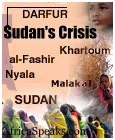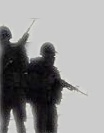 |






 AfricaSpeaks Weblog AfricaSpeaks Weblog
 Rootswomen Weblog Rootswomen Weblog
 Rootsie's Weblog Rootsie's Weblog
|
The U.S. should not rule by force
Posted: Thursday, May 1, 2003
By Ash Pulcifer yellowtimes.org
The vision espoused by the Bush administration and other American elites is one in which the United States plays the role of the "indispensable nation," needed by the global community to preserve world order. This attitude of Washington further highlights how the mission to turn the United Nations into the moderator of world order has failed. In Washington's eyes, the United Nations can continue to do its humanitarian work, but the world now must come to understand that the United States is the only state that is strong enough militarily to neutralize governments considered dangerous to Washington's definition of a desirable world order.
This argument is only valid, however, if one overlooks the fundamental fact that much of the world does not accept the United States as being the global policeman and ultimate enforcer of world order. There is simply too much distaste for the United States abroad for the U.S. to be able to rule the world through persuasion rather than coercion. In Middle Eastern countries, for example, there is genuine hatred for U.S. policies, and in Western Europe there is a growing revulsion toward U.S. hegemonic ambitions. This anger is founded upon the disagreement with the U.S. societal model. In other words, much of the world is not yet convinced that the "American way" is the right way.
Of course, there is much to be envied in U.S. society. Compared to much of the world, the U.S. can boast of attractive freedoms and opportunities for its citizens, but there is also a lot to be avoided, such as America's consistent failure to take care of the less privileged members of its society. Other advanced countries, which also share the great freedoms and opportunities found in the United States, have more socialistic domestic policies, in which the state's accumulated wealth is spread all the way down to the lowest rungs on the societal ladder. This socialistic domestic policy is often frowned upon in Washington. The disagreement with America's societal model is why there is so much resentment toward U.S. power politics abroad. Other states simply do not like the idea of the United States attempting to reshape the world in its image.
These disagreements are why the United States should not be following such an intense foreign policy. Until America is able to convince the world of the superiority of the U.S. societal model, it has no business performing "regime change" in countries it dislikes. If it continues to ignore the world's objections, then the U.S. will only create more and more resentment. Growing resentment, which is increasing at alarming rates, held towards the United States, will only work to damage the future of U.S. global success.
According to the Pew Research Center for the People and the Press, in their "What the World Thinks in 2002" poll, resentment toward the United States grew tremendously between 1999/2000 and 2002. In 19 of the 27 countries polled, attitudes toward the United States fell. In Muslim majority countries, America's image plummeted. All across Latin and South America, views toward the United States eroded in these last two years. The largest change was in Argentina, where many Argentineans blame U.S. dominated financial institutions for their current economic demise. In 1999/2000, 50 percent of Argentineans had a favorable view of the United States, compared to just 34 percent now, a drop of 16 percent. Germany, whose population used to have a 78 percent approval rating of the United States, has seen a 17 percent drop in positive attitudes toward the United States. Even Great Britain, one of America's staunchest allies, saw an 8 percent drop in favorable attitudes toward the United States.
This trend cannot be taken lightly. It embodies the failure of the U.S. to convince the world of the superiority of its societal model. This failure will mean that other states will not be inclined to work within the United States' form of world order; it means that other states will attempt to compete with the U.S. model. Possible results of this failure are a reemergence of European nationalism, this time within the confines of the European Union, or it could mean that China will work to increase its military to a size capable of threatening U.S. hegemony in Asia. Either way, if subsequent U.S. administrations continue to pursue power politics at the expense of international institutions, a major conflict will be hard to avoid.
[Ash Pulcifer is a U.S. based analyst of international conflicts and is also a human rights activist. While he does not justify or accept the killing of civilians in warfare, he attempts to understand why groups or governments resort to such means in order to achieve their strategic objectives.]
 Printer friendly version Printer friendly version
 Send page by E-Mail Send page by E-Mail
|








